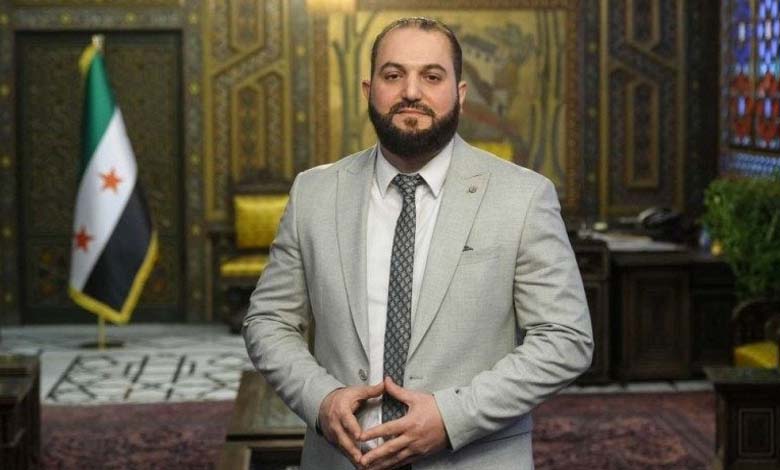New Governor of Damascus Calls for U.S. Mediation for Peace with Israel

Maher Marwan, the new governor of Damascus, says that the new Syria cannot be an enemy of Israel, expressing his understanding of Israeli concerns, including Israeli bombings and incursions into the Golan.
Maher Marwan, the new governor of Damascus appointed by Syria’s de facto leader Ahmad al-Shara (formerly Abu Mohammed al-Joulani), made a surprising statement in which he called on the United States to establish peace between Syria and Israel.
-
“Including Syria and Lebanon”: How the Israeli Army Prepares for “Operation Winter”
-
What is the Relationship between the Founding of the Muslim Brotherhood in Egypt, Iraq, Syria, and the Greater Israel Project?
In an interview with the U.S. public radio network NPR, he stated: “There is a people who want to coexist. They want peace. They do not want conflicts. We want peace, and we cannot be an enemy of Israel or anyone.”
He continued, “It is natural for Israel to feel concerned about some factions… Maybe they felt fear, so they moved a little, bombed a little, and so on. We are not afraid of Israel, our problem is not with Israel. We do not want to interfere with anything that threatens its security or the security of any other country.”
-
Israel targets Hezbollah on Syrian and Lebanese fronts
-
The flying of Israeli jets very low over parts of Lebanon and blasts in Syria
An American official confirmed that the message from the new Syrian government was conveyed to Israel, but noted that the White House is not urging either side to take steps toward establishing relations at this time.
This comes while direct dialogue continues between the United States and the new Syrian leadership since the fall of Bashar al-Assad‘s regime, which led to the cancellation of the $10 million reward for anyone providing information leading to the capture of Al-Shara due to his past jihadist activities.
-
Al-Julani Rewards Turkey by granting it Priority in Syria’s Reconstruction
-
Where Are Maher al-Assad and Ali Mamlouk Hiding? What Are Their Plans?
Israeli officials have indicated that while Americans understand Israel’s security needs and concerns, they believe Israel should give the new regime a chance. In contrast, Israel adopts a more skeptical stance regarding the intentions of the new leadership in Syria.
Recently, the transitional Syrian government led by Al-Shara announced several appointments, including new governors for the country’s provinces, one of whom is Maher Marwan. The governors will remain in office for three months within the timeframe allocated for forming the new government.
-
“Al-Joulani’s Plans”: Abolishing Mandatory Military Service and Undermining Syrian Kurds
-
Decoys and Fake Helicopters: New Details Emerge About al-Assad’s Escape from Syria
According to Arab media reports, Marwan was born in Damascus in 1979 and participated actively in protests in Syria starting in 2011. He lived in Saudi Arabia, Damascus, the city of Qaryatayn in the countryside of Homs, and later in Idlib. He studied at Idlib University and held various positions within the Syrian opposition, which now controls the country.
It seems that Israeli officials were not influenced by the governor’s statements, as sources in Jerusalem told “Wynet” earlier this week that “the burden of proof lies with Al-Shara and his group. We must not forget their ideological foundations.”
-
With the support of foreign intelligence agencies, the Muslim Brotherhood exploits events in Syria to promote their rumors
-
Secret Turkish Deals with Russia and Iran Accelerated al-Assad’s fall
According to these sources, the “warm” messages sent by the new leadership in Damascus remain a mystery, as no one knows which direction the new regime might take. While Al-Shara and his team “say the right things,” the prevailing mood in Israel after October 7 is marked by doubt and fear of a “charm offensive” aimed at deceiving the West.
Al-Shara is not affiliated with ISIS. He was active in Al-Qaeda but left the group years ago and moved to other jihadist paths with Syrian nationalist orientations. In the past, he led the al-Nusra Front while it was part of Al-Qaeda, and the group itself maintained relations with Israel.
-
Russia Reduces Military Presence in Syria Following al-Assad’s fall
-
Syria, Victim of its Geography: Why Does It Continue to Suffer?
Israelis believe it is too early to predict Al-Shara’s intentions or his ability to keep Syria unified and democratic. Under Assad, Syria was unified through brute force, and Al-Shara imagines a “different Syria,” with parliamentary representation for all sects.
He claimed that he was not seeking confrontation — neither with Israel, nor with the Druze, nor with the Alawites, nor with the Turks. Currently, it is clear that he and his team are working to ease tensions, whether from a sincere intention or as a calculated manipulation.
-
Israel Prepares for Worst-Case Scenarios in Syria
-
After Al-Assad’s Fall… Syria Closes Its Doors to the Houthis
He had previously stated that the logic of the state differs from the logic of the revolution, and that the state’s logic assumes that weapons are concentrated in the hands of the state, focusing on reconstruction, development, social justice, and establishing balanced relations with all countries.
Despite all the assurances in this direction regarding the protection of minorities, the avoidance of retaliation, and the defense of human rights and freedoms, Western powers are waiting for actions, not words, and maintain their doubts about Al-Shara’s and his team’s intentions until they concretely prove that what they say is true and that actions will speak louder than words.












